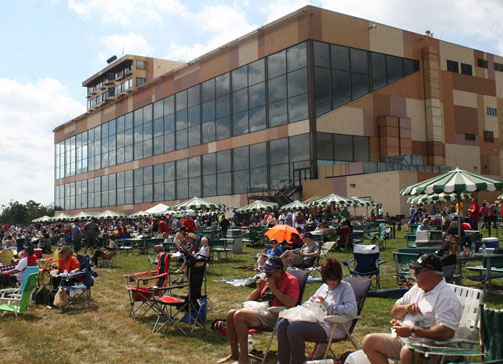By T. D. Thornton
After learning that the live racing portion of operations at Parx Casino and Racing might be up for bid and that The Stronach Group (TSG) could be the lead suitor to take over, the Pennsylvania Thoroughbred Horsemen's Association (PTHA) has moved swiftly to initiate negotiations with Greenwood Gaming and Entertainment Inc., the track's corporate owner, about managing the suburban Philadelphia track.
“When we became aware that Stronach was going to talk to them, I approached [Greenwood] and said 'If you're interested in doing this, we would like to be participants and have a similar discussion with you,' and they agreed,” PTHA president Salvatore DeBunda said in a Friday phone interview.
While DeBunda readily acknowledged the rumors that have been swirling for several weeks about a potential change in racing operations at Parx, getting the other parties to confirm their levels of involvement remains elusive.
Joe Wilson, Greenwood's chief operating officer, did not return a Friday voicemail message requesting comment prior to deadline for this story.
Tim Ritvo, TSG's chief operating officer, told TDN he was not at liberty to say whether or not his company is in the process of brokering a deal with Parx, although he did acknowledge that scenario is “not totally out of left field.”
TSG owns six United States racetracks, and over the past year has demonstrated remarkable commitment to revitalizing Laurel Park. In the mid-Atlantic region, TSG also owns Pimlico Race Course, and Ritvo has been on the record since last summer about TSG's desire to bring the mid-Atlantic tracks together to form a cooperative circuit.
At any given time of the year, tracks in Maryland, Pennsylvania, New Jersey, Delaware and West Virginia are all competing for essentially the same shrinking population of horses. To consolidate operational costs while enhancing the region's racing product, TSG has floated a number of ideas, such as establishing a “centralized racing office.” Having TSG take over the racing aspects at Parx could be a major step toward eliminating overlapping regional race dates while boosting both field sizes and betting handles.
“A lot of stuff I'm reading [about TSG and Parx] is not true,” Ritvo said. “But we're always out there trying to figure out what makes the most sense in the mid-Atlantic. We've talked to Delaware. We've reached out to a bunch of jurisdictions to see who wants to talk about what a competitive race schedule looks like, but that's really all of where we're at. There's stuff I have to be careful with. I just can't say much right now.”
Although the “less is more” approach to bolstering pari-mutuel business sounds like a worthwhile idea in theory, in practice it has been difficult to get horsemen in any U.S. region to give up race dates for the sake of harmonization among competing tracks.
“We have a live racing agreement that's in effect [through 2018], and we would assume that any provisions of that live racing agreement would govern no matter who owns or manages the Parx racing,” DeBunda said. “There are dates in there and a lot of other things that have to do with regulation between Parx racing and the PTHA.”
TSG's experience in racetrack management and considerable corporate clout within the industry would appear to make it a frontrunner for managing racing at Parx. But DeBunda pointed out that Greenwood might be inclined to opt for an in-state operational team because the support of the PTHA would be vital to presenting a unified front to Pennsylvania regulators.
“We believe if they're going to have to go and get [state] approvals, they're going to be a lot better off with us as that manager rather than someone from outside the state, because we would not be opposing it,” DeBunda said. “There is a recognition that if they could do something with the PTHA, the path would be a lot smoother than trying to bring in someone from outside the state to manage the track.”
DeBunda said the PTHA could create a separate management entity within its own organization, similar to how the PTHA operates other business offshoots, like its purchasing association that buys feed or the team that manages the Turning For Home equine aftercare program.
“We would probably use existing [Parx] staff or bring in additional staff if we had to,” DeBunda said. “It would not necessarily be horse trainers running it, it would be people who are appropriate [for racetrack management jobs]. But we would have the responsibility for managing the facility, and that would include OTBs.”
DeBunda underscored, though, that specifics about assembling a PTHA management team are premature at this point.
“Stronach will be meeting with [Greenwood] and we will be meeting with them. Not at the same time, obviously,” DeBunda said. “I think both Stronach and us have signed confidentiality agreements about what would happen in connection with this. We don't know if it's going to happen at this point. There have been no meetings with anyone at all. But those meetings should be occurring in the next month.”
Not a subscriber? Click here to sign up for the daily PDF or alerts.






